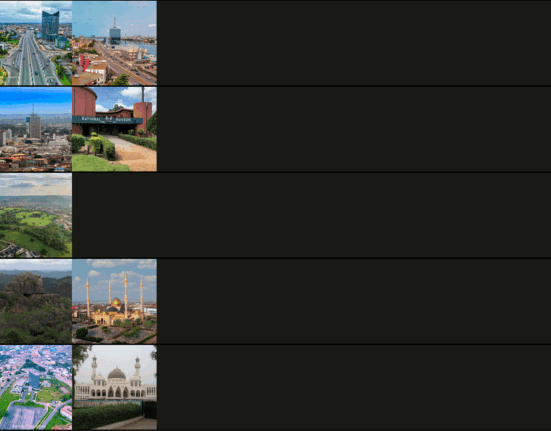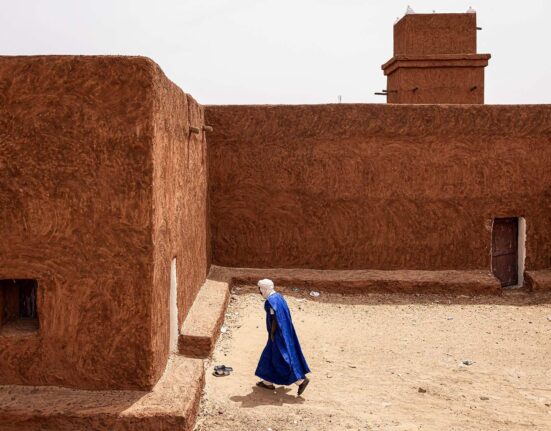Living in Nigeria offers a vibrant and diverse urban landscape, each city with its own unique character and opportunities. A Reddit user recently shared their personal tier list of Nigerian cities, sparking discussions on economic activities, opportunities, and size rather than cleanliness or beauty. Let’s delve into the tiers and explore the factors that shape these rankings.
In Tier 1, we find the bustling metropolises of Abuja, Port-Harcourt, and Lagos. These cities stand out for their robust economic activities, job opportunities, and sheer size. Abuja, the capital city, exudes a sense of power and influence with its government presence and modern infrastructure. Port-Harcourt, known for its oil industry, attracts professionals seeking lucrative careers. Lagos, the commercial hub, pulsates with energy and entrepreneurship, drawing people from all over the country.
Moving down to Tier 2, we encounter Kano, Ibadan, and Benin. These cities offer a blend of traditional charm and emerging opportunities. Kano, a historical center of commerce, retains its cultural richness while embracing modernization. Ibadan, with its academic institutions and cultural heritage, provides a nurturing environment for education and growth. Benin, steeped in history and art, showcases a unique blend of tradition and progress.
In Tier 3, Kaduna and Enugu hold their place as cities with growing potential. Kaduna, a strategic location for trade and industry, is poised for economic expansion. Enugu, known for its coal mining history and natural beauty, offers a tranquil setting for development and investment.
Tier 4 introduces us to Aba, Jos, and Ilorin, cities facing challenges but with untapped potential. Aba, a hub for small-scale industries, grapples with infrastructure deficits yet thrives on entrepreneurial spirit. Jos, with its temperate climate and scenic landscapes, struggles with security issues but remains a cultural gem. Ilorin, a city with historical significance, seeks to carve a niche in the evolving Nigerian urban landscape.
Finally, Tier 5 includes Warri, Uyo in Akwa Ibom, and Maiduguri, cities with unique characteristics and opportunities. Warri, a key player in the oil and gas sector, grapples with socio-economic challenges but holds promise for growth. Uyo, known for its serene atmosphere and hospitality, showcases potential in sectors like tourism and agriculture. Maiduguri, despite facing security concerns, embodies resilience and community spirit in the face of adversity.
While this tier list is subjective, it sheds light on the diverse dynamics at play across Nigerian cities, beyond surface-level aesthetics.
The Reddit post sparked a flurry of comments, reflecting the community’s varied experiences and viewpoints. Some users resonated with the rankings based on economic viability and job prospects, while others highlighted the importance of factors like infrastructure, safety, and quality of life. Discussions veered into personal anecdotes, with individuals sharing their love for their hometowns or their aspirations to explore new opportunities in different cities.
It’s evident that each city in Nigeria has its own story to tell, shaped by historical legacies, socio-economic factors, and the aspirations of its residents.
Looking beyond individual preferences, this tier list offers insights into broader trends and implications for urban development in Nigeria. It underscores the need for strategic planning, infrastructure investment, and policies that promote inclusive growth across cities of varying sizes and capacities. As Nigeria continues on its path of urbanization and economic diversification, understanding the strengths and challenges of different cities becomes crucial for sustainable development.
Ultimately, the tier list serves as a starting point for deeper conversations on urban dynamics, regional disparities, and the collective journey towards building vibrant, resilient cities in Nigeria.
In conclusion, Nigeria’s city tier list encapsulates a tapestry of narratives, aspirations, and opportunities that define the urban landscape of the nation. From the bustling hubs of Tier 1 to the emerging potentials of Tier 5, each city contributes to the rich tapestry of Nigeria’s urban fabric. As residents navigate the complexities and possibilities of urban life, the tier list stands as a testament to the diverse and dynamic nature of Nigerian cities, beckoning exploration, innovation, and collaboration for a brighter urban future.









Leave feedback about this